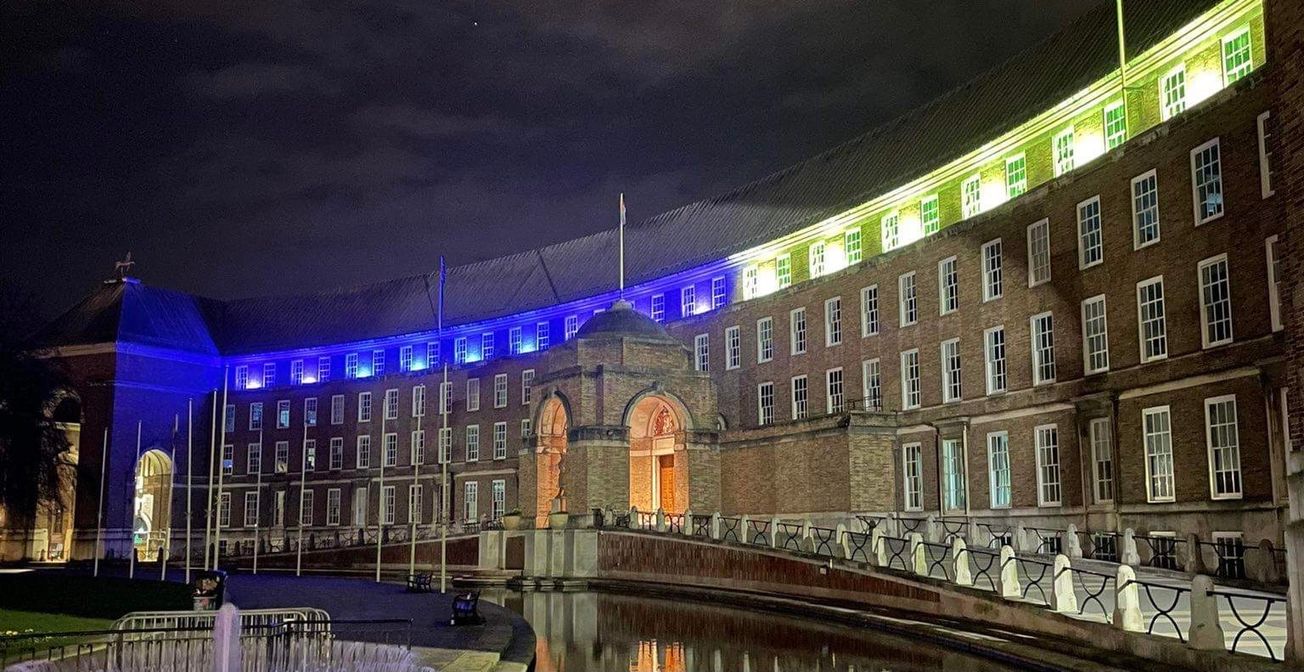By Nadja Lovadinov, Third Year Geography
Opora is an online platform and charity that provides centralised information channels for Ukrainian refugees in the UK. It also delivers a safe and structured ‘matchmaking’ service for those searching for accommodation sponsors.
‘Opora’, meaning support in Russian-Ukrainian, encapsulates the charity's mission to offer emergency and long-term support for the rebuilding of livelihoods, whilst ‘allowing Ukrainians to retain agency and choice in the process’, according to Opora's website.
Epigram spoke to Yegor Lanovenko, the founder and chairman of Opora who graduated from the University of Bristol in 2014, to find out what ‘long-term’ sustainable rebuilding of lives means, and how refugees preserve their agency through platforms like Opora.

As of May 19 2022, 6.3 million refugees have fled Ukraine. 0.7% of these refugees (46,000) have chosen to come to the UK under family visas and the Homes for Ukraine scheme. Thousands of Britons have offered their homes. Bristol, the ‘City of Sanctuary’, has had 107 Ukrainian visas for Bristol approved, at least 35 of which have found accommodation sponsors through Opora. In fact, Yegor notes that many Ukrainians have settled in South West areas, such as Devon and Dorset, as many second homeowners have available space to host refugees.
Opora’s work began when the war broke out, supporting Ukrainians arriving in the UK under the family visa schemes, which was initially the only refugee route for Ukrainians. With the announcement of the Homes for Ukraine government scheme, the Opora team sought to address the practical shortcomings and process gaps in the implementation of this scheme. Opora launched one of the first platforms to allow Ukrainian guests to find UK sponsors, which now has over 20k users and over 3k reported matches.
However, finding a sponsor and receiving the visa is only the start of the process, with a lot more structural and long-term support needed locally and nationally post-arrival. The Guardian, The Independent and Daily Mail have reported that the Homes for Ukraine scheme is unravelling. As hosts belatedly recognise the responsibilities of their commitment, along with a realisation of costs and lifestyle differences, many refugees are being left homeless after falling out with hosts and being told to find new sponsors.
Evidently, despite the support and goodwill of Britons and Bristolians, there are gaps and structural issues with the Homes for Ukraine scheme. Yegor argues that successful long-term resettlement depends on local and practical implementation of national policy, which falls to local authorities and in many cases charity and community organisations.

Local authorities have been asked to play a key delivery role by the government in the scheme, from conducting security and safeguarding / accommodation checks of the sponsors, to creating further schools and providing infrastructure. In many cases, they lack the resources and practical capacity despite additional funding allocated by the government.
This also highlights the practical challenges in translating national policy into local context at speed - through its engagement with many councils, Opora identified that until recently there was little to no guidance received by local authorities from the Home Office and the Department for Levelling Up in terms of technical processes for changing sponsors for refugees or transferring government funding between local authorities. These are issues that will become more prominent and will obstruct sustainable reconstructions of livelihoods.
Clearly, policies for refugees need to consider such forced migration not only as a short-term humanitarian issue, but a long-term developmental matter. Failure to do so opens many structural gaps. Opora is finding long-term solutions to answer ‘what happens next’ by bridging these systemic gaps such as language barriers, unfamiliarity with the UK system and obtaining employment. They offer assistance navigating these issues through numerous guides on the Opora website.
To prevent occupational downgrading, Opora has made developing entrepreneurship their priority. Opora’s Business Grant Scheme gives Ukrainian refugee-led businesses in the UK up to £5000. These grants facilitate sustainable rebuilding of livelihoods. Its multiplying impact nurtures further job growth, helping rebuild communities whilst integrating new businesses in the UK economy.
Regarding Opora’s platform for Homes for Ukraine, Yegor says that ‘we are not creating matches for refugees.’ Rather, ‘we are allowing communities to connect’ and retain their agency leveraging technology as an enabler to do this at scale.
Despite the traumas, loss, and victimhood of war, perhaps a shift in narrative is needed; one that recognises refugees not as passive recipients of British goodwill, but as active agents, many of whom are young professionals and want to be independent and in charge of rebuilding their lives.
Yegor notes that there is a large demand to rebuild businesses, and at least 50 applications have been made for the business grant. These applicants ran businesses in Ukraine, from security and technology companies to international designer labels. Young professionals constitute a large demographic of the Ukrainian refugee population in the UK, thus Opora is working with businesses and industries to allow for recognition of genuine opportunities and mutually beneficial relationships with young refugees offering recruiting businesses.
The Bristol Uni students volunteering on the Ukrainian Border
‘There are already queues in the gun shop’ – Eastern European students remind us of Bristol’s part to play in the Ukraine crisis
Universities have acknowledged their role in supporting this young adult cohort. Southampton, Manchester, Lancaster, and Warwick offer Sanctuary Scholarships, and Oxbridge are offering 40+ fully funded places between the two universities.
At the same time, Yegor appreciates that ‘higher education is a massive privilege rather than a right,’ so whilst he welcomes these scholarships, the real transformative power for Yegor lies in the student-university community. This community can channel their efforts with employment support and advertising opportunities. Yegor suggests a pairing system of young UK students with young Ukrainian professionals/students, to offer occupational and educational guidance. Integration can be achieved by allowing platforms like Opora to work with universities and tap into community resources.
Yegor’s message to the Bristol student community is that ‘you don’t need to be able to offer a room to offer your time, care, and energy. There are multiple ways to get involved, and different routes to be taken to channel the skills of a community to support. There are many ways to engage and contribute positively to these efforts, and please get in touch with the Opora team if you have time and/or skills to dedicate.’
Click here to learn more about Opora.
Main photo credit: Martin Booth
How can Bristol students best support Ukrainian refugees?









